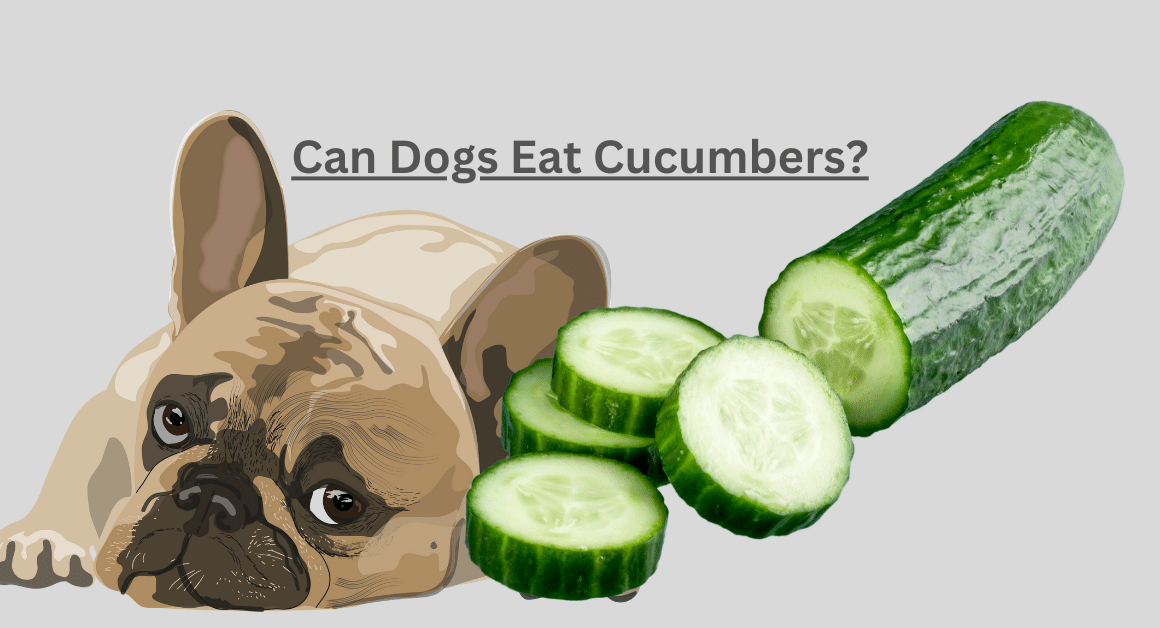When it comes to our furry friends, we always want to make sure they’re happy, healthy, and well-fed. As responsible dog owners, we know a balanced diet is essential for our canine companions. But what about cucumbers? Can dogs eat this crunchy and refreshing vegetable? ( Can Dogs Eat Cucumbers?) Let’s explore this topic and determine if cucumbers are a safe and healthy treat for our beloved dogs.
Table of Contents
Nutritional Value of Cucumbers
Before diving into whether dogs can eat cucumbers, let’s take a quick look at their nutritional value. Cucumbers are low in calories and packed with vitamins and minerals. They are an excellent source of hydration due to their high water content, which can be beneficial for dogs, especially during the hot summer months. Additionally, cucumbers provide a good amount of dietary fiber, aiding in healthy digestion for our furry friends.
Health Benefits of Cucumbers for Dogs – Can Dogs Eat Cucumbers?
Hydration and Cooling Effects
Like humans, dogs need to stay hydrated, and cucumbers can help. The water content in cucumbers can be refreshing and help keep your dog hydrated, especially during warm weather or after physical activities. Offering a few slices of cucumber as a treat can be a great way to provide that extra bit of moisture.
READ NOW: Can Dogs Eat Chicken Bones?
Potential Weight Management Benefits
If your dog is on a weight management plan, cucumbers can be a great addition to their diet. Since cucumbers are low in calories and fiber, they can provide a feeling of fullness without adding excessive calories. However, consider the overall calorie intake and consult your veterinarian to ensure the appropriate portions for your dog’s specific needs.
Promoting Healthy Digestion
Fiber is essential for maintaining a healthy excretory system, and cucumbers are a good source of dietary fiber. Including cucumbers in your dog’s diet can help regulate bowel movements and promote a healthy digestive tract. Just introduce cucumbers gradually into their diet to avoid any digestive upsets.
SEE NOW: Can Dogs Eat Peppers?
Potential Risks and Precautions
While cucumbers offer several health benefits, it’s important to be aware of potential dangers and take necessary precautions when feeding them to your furry friend.
Choking Hazard for Dogs
Cucumbers can present a choking hazard like any other crunchy food if not sliced into appropriate sizes. Ensure the cucumber slices are small enough for your dog to chew and swallow safely.
Pesticide Exposure and Choosing Organic Cucumbers
Conventionally grown cucumbers may contain traces of pesticides, which can harm dogs. Opt for organic cucumbers whenever possible to reduce the risk of pesticide exposure. If organic cucumbers are unavailable, wash them thoroughly before feeding them to your dog.
Overfeeding and Digestive Issues
While cucumbers can be a healthy interpolation to your dog’s diet, overfeeding can lead to digestive issues such as Delhi belly.
Or an upset stomach. Moderation is key when it arrives to treating your dog with cucumbers. Start with small amounts and observe how your dog’s digestive system responds. If any adverse response occurs, consult with your veterinarian.
Allergic Reactions or Intolerances
Although rare, some dogs may have allergies or intolerances to cucumbers. Watch for any signs of allergic response, such as itchiness, swelling, or digestive disturbances. If you notice any unusual symptoms, discontinue feeding cucumbers and consult your veterinarian.
Oxalates in Cucumbers and Kidney Issues
Cucumbers contain a moderate amount of oxalates, which can provide to the formation of kidney stones in susceptible dogs. If your dog has a history of kidney issues, it’s best to consult your veterinarian before including cucumbers in their diet.
Feeding Cucumbers to Dogs
Now that we’ve covered the benefits, risks, and precautions, let’s explore the best ways to feed cucumbers to your furry friend.
Preparing Cucumbers for Dogs
Before offering cucumbers to your dog, it’s essential to prepare them properly. Wash the cucumber thoroughly to clear away any dirt or pesticide residue. If the cucumber has tough skin, consider peeling it to make it easier for your dog to chew and digest. Finally, slice or chop the cucumber into bite-sized pieces suitable for your dog’s size.
Serving Methods
Depending on their preferences and dietary needs, there are various ways to serve cucumbers to your dog.
- Raw cucumber slices: Offer your dog a few fresh ones as a healthy and hydrating treat.
- Frozen cucumber treats: During hot summer days, freeze cucumber slices for a cooling and refreshing snack.
- Mixing cucumbers with dog food: Chop cucumbers into smaller pieces and mix them with your dog’s regular food to add some crunch and freshness.
- Blending cucumbers in homemade treats or dog-friendly recipes: Get creative by incorporating cucumbers into homemade treats or recipes specifically designed for dogs. There are plenty of recipes available online to explore.
Portion Control and Moderation
Remember that cucumbers should be given to your dog in moderation. As a general guideline, treats should make up no more than 10% of your dog’s daily calorie intake. Monitor your dog’s reaction to cucumbers and ensure their diet is balanced. Consult your veterinarian if you need clarification on your dog’s appropriate portion sizes.
Alternatives to Cucumbers – Can Dogs Eat Cucumbers?
If your dog isn’t a fan of cucumbers or you want to offer some variety in their diet, you can consider other dog-friendly vegetables and fruits.
SEE ALSO: Can Dogs Eat Apples?
Other Dog-Friendly Vegetables
- Carrots: Crunchy and packed with vitamins, carrots make an excellent low-calorie treat for dogs.
- Green Beans: High in fiber and low in calories, green beans can be a nutritious addition to your dog’s diet.
- Zucchini: Another hydrating vegetable, zucchini is gentle on the digestive system and can be a tasty option for your furry friend.
Fruits Suitable for Dogs
- Apples: Remove the seeds and core, then offer your dog small apple slices as a crunchy and vitamin-rich treat.
- Watermelon: Remove the seeds and rind, and give your dog small amounts of watermelon for a refreshing and hydrating snack.
- Blueberries: Packed with antioxidants, blueberries make a sweet and nutritious dog treat.
Exploring Variety in a Dog’s Diet
Just like us, dogs appreciate variety in their meals. It’s important to ensure a balanced overall diet while incorporating different vegetables and fruits into their diet. Discuss with your veterinarian to ensure your dog’s nutritional needs are met.
READ ALSO: Can Dogs Eat Blueberries?
Conclusion – Can Dogs Eat Cucumbers?
So, can dogs eat cucumbers? The answer is yes but with some important considerations. Cucumbers can be a healthy and refreshing addition to your dog’s diet, offering hydration, fiber, and potential weight management benefits. However, it’s crucial to be mindful of portion sizes, potential risks, and your dog’s needs. Always introduce cucumbers gradually, monitor your dog’s reactions, and consult your veterinarian for personalized dietary advice.
By offering moderation of cucumbers or other dog-friendly vegetables and fruits, you can treat your furry friend to a delicious and nutritious snack while keeping their diet balanced and healthy.




